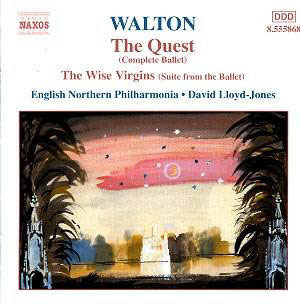The Walton centenary has done much to raise the composer's
standard, as it rightly should, and this enterprising Naxos issue is
a useful addition to the catalogue.
The largest of the three pieces is much the least known.
The ballet The Quest was composed during the Second World War,
based on Spenser's allegorical poem The Faerie Queene, and intended
to follow in the footsteps of the Henry V film music in boosting
morale. This version by the English Northern Philharmonia is the first
recording to use the composer's original orchestration, rather than
the revised score which Walton hoped would bring the music a wider currency
in the concert hall. It never did, however.
The music itself is therefore worthy of comment. The
tone is set immediately, with a really arresting opening, with some
telling harmonic astringency giving the music plenty of attack. David
Lloyd-Jones and his orchestra clearly relish their task, and their performance
has a wide-ranging yet cogent intensity. The recording, although not
of demonstration quality, is clear enough. Climaxes can sound a little
boxy but the playing is very good indeed. At the bargain Naxos price
collectors need not hesitate, for the music is well worth getting to
know.
Walton is an interesting composer, in that there is
plenty to discover beyond the well known pieces which dominate our awareness
of his achievement. Two further examples serve as companion pieces on
the programme here. The performance of Siesta is delightfully
characterised. It is an early work, composed in 1926 not long after
Portsmouth Point had shown Walton's debt to Stravinsky's rhythmic
angularity. In that context Siesta might be regarded as an antidote,
having been inspired by the composer's already potent love of southern
Italy. The title lulls the listener into a false sense of security,
however. For there is no lack of challenge, with sudden shifts of dynamic
and other unexpected turns. Not the most peaceful of siestas, in other
words.
In The Wise Virgins, Walton joined the long
list of composers who had been inspired by the music of Bach. This was
another wartime commission, from Frederick Ashton and the Vic-Wells
Ballet, for a score to accompany a choreographed version of the story
of the wise and foolish virgins. Walton's sources were cantatas and
a chorale prelude, revealing a deep knowledge of Bach (or perhaps piano
arrangements of Bach). His orchestrations and arrangements have a sure
and imaginative touch, in any case. The orchestra used is not large,
but it is always imaginatively treated.
Lloyd-Jones conducts a well paced performance, but
the phrasing might have been more keenly articulated. To some extent
this may be the fault of the recording acoustic, which somehow undermines
the music's impact. Like the performance, the accompanying note tends
to undersell the music a little. For this is an interesting, though
not an outstanding, compilation of music by one of the great composers
of the 20th century.
Terry Barfoot


